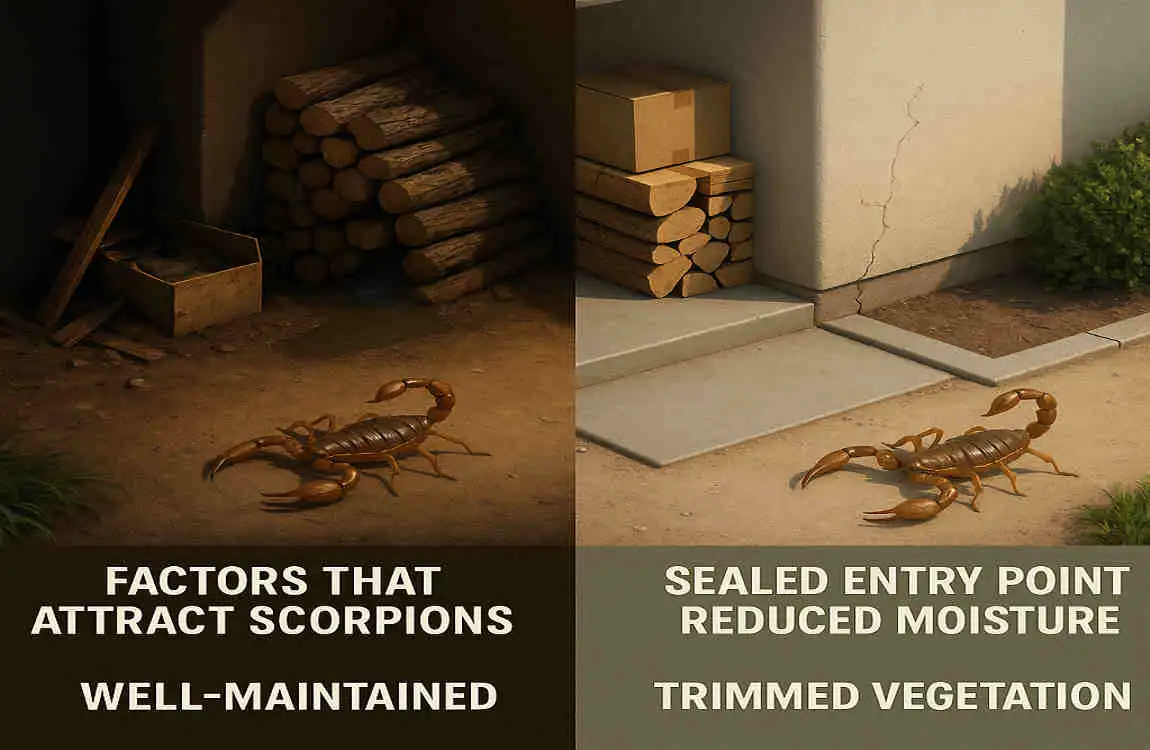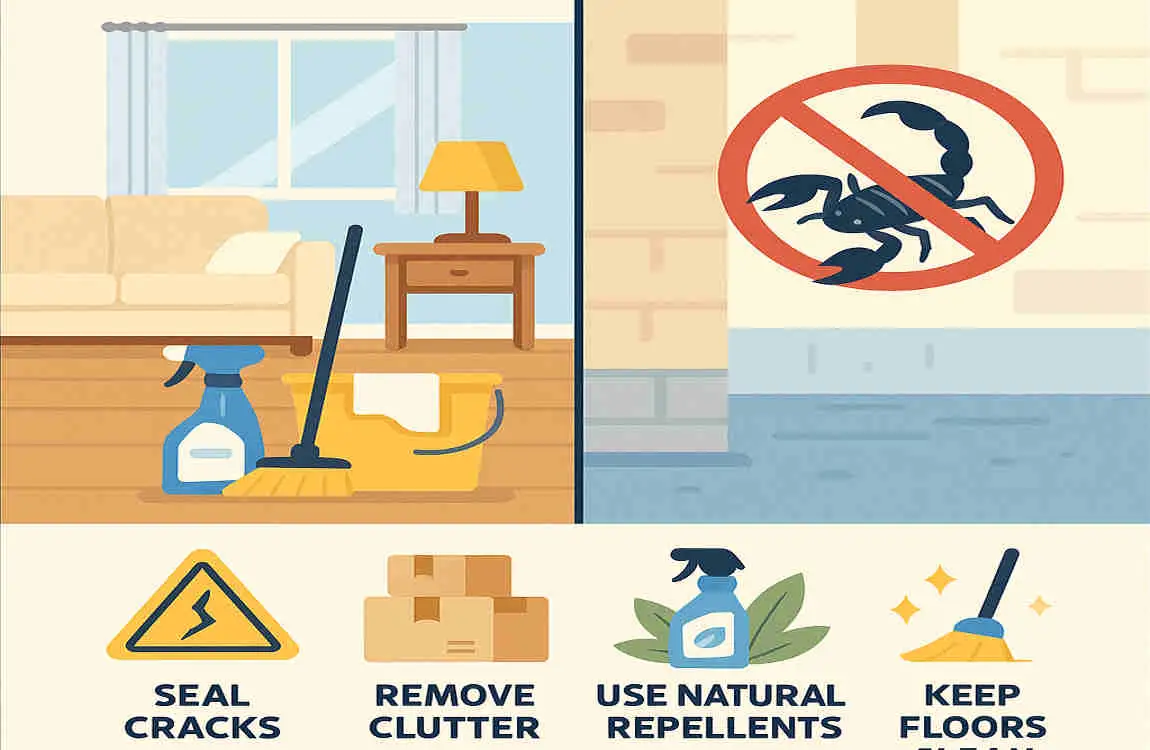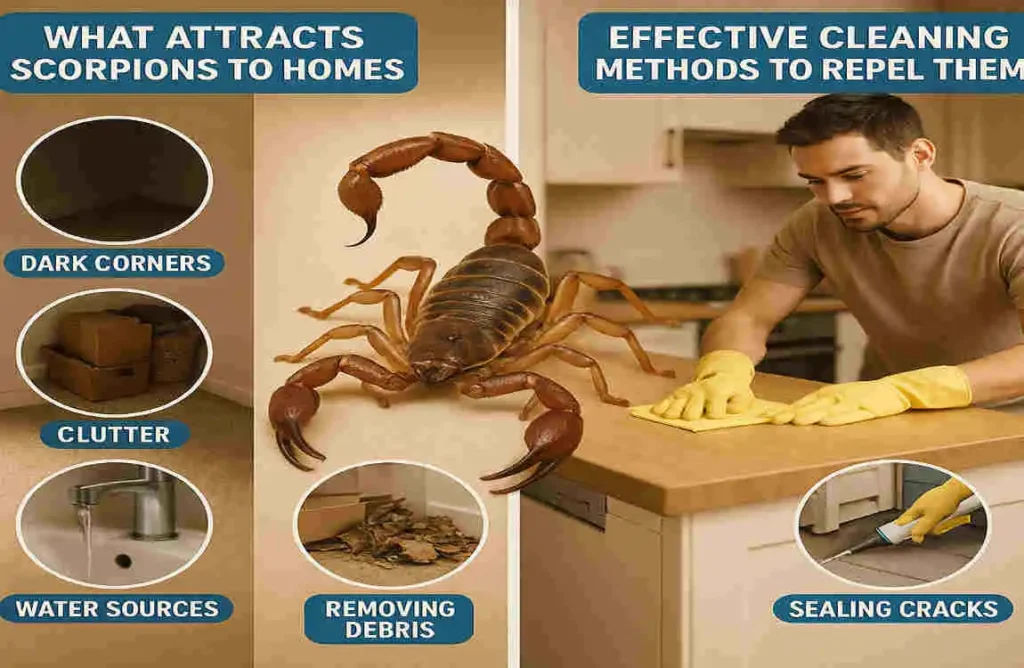Have you ever wondered why scorpions seem to find their way into your home? It’s a common problem that many homeowners face, especially in regions where these creatures are prevalent. Understanding what attracts scorpions to your house is crucial for keeping them at bay.
Understanding Scorpion Behavior and Habits

Before we delve into the specifics of what attracts scorpions house cleaning, let’s take a moment to understand these fascinating creatures and their behavior.
What Are Scorpions and Why Do They Seek Shelter in Homes?
Scorpions are arachnids that belong to the same family as spiders, ticks, and mites. They are nocturnal predators that feed on a variety of insects and other small creatures. When it comes to seeking shelter, scorpions are drawn to homes for several reasons. Firstly, homes provide them with a ready source of food in the form of insects and spiders. Secondly, the warmth and protection offered by a house are attractive to scorpions, especially during colder months or in extreme weather conditions.
Typical Environments and Conditions That Attract Scorpions
Scorpions thrive in warm, dry climates, but they can also be found in humid areas. They are commonly found in regions such as the southwestern United States, Mexico, and parts of Central and South America. However, scorpions have been known to adapt to various environments, so it’s essential to be aware of their presence regardless of your location.
How Climate and Geography Affect Scorpion Activity
The activity of scorpions is closely tied to climate and geography. In warmer regions, scorpions are active year-round, while in cooler areas, they may become more active during the summer months. Additionally, scorpions are more commonly found in areas with rocky terrain, deserts, and grasslands. However, they can also be found in urban and suburban settings, especially when there are suitable hiding spots and a readily available food supply.
Common Hiding Spots Scorpions Prefer Inside and Outside the House
Scorpions are masters of concealment and can squeeze into the tiniest of spaces. Inside the house, they often hide in dark, secluded areas such as closets, basements, and garages. They may also be found behind furniture, in piles of clothing or linens, and in cracks and crevices in walls and floors. Outside the house, scorpions may take refuge under rocks, logs, and debris, as well as in dense vegetation and mulch.
The Link Between Clutter, Moisture, and Scorpion Presence
Clutter and moisture are two factors that can significantly increase the likelihood of scorpions invading your home. Clutter provides scorpions with ample hiding spots, while moisture attracts the insects and other prey that scorpions feed on. By keeping your home clean and dry, you can make it less appealing to scorpions and reduce the risk of an infestation.
What Attracts Scorpions to Your House?
Now that we have a better understanding of scorpion behavior and habits, let’s explore the specific factors that draw them to your home.
Moisture and Water Sources
Scorpions are attracted to moisture, as it provides them with the hydration they need to survive. Leaky pipes, standing water, and humid areas such as bathrooms and kitchens can all attract scorpions to your home. By addressing these moisture issues and keeping your home dry, you can make it less inviting to scorpions.
Food Supply
As mentioned earlier, scorpions feed on a variety of insects and other small creatures. If your home is infested with ants, cockroaches, spiders, or other pests, it can serve as a buffet for scorpions. By implementing effective pest control measures and keeping your home clean, you can reduce the availability of food for scorpions and discourage them from taking up residence.
Shelter and Hiding Places
Scorpions are masters of hiding and can squeeze into the tiniest of spaces. Clutter, piles of wood, debris, and cracks and crevices in walls and floors can all provide scorpions with the shelter and hiding spots they need. By decluttering your home and sealing up entry points, you can make it more difficult for scorpions to find a comfortable place to hide.
Landscaping Factors
The way you landscape your yard can also affect the likelihood of scorpions invading your home. Dense shrubs, mulch, and stones near the foundation of your house can provide scorpions with a convenient hiding spot and easy access to your home. By keeping your yard well-maintained and free of debris, you can reduce the risk of scorpions entering your home.
Entry Points
Finally, scorpions can enter your home through various entry points, including open doors, damaged window screens, and gaps in walls and foundations. By sealing up these entry points and keeping your home well-maintained, you can make it more difficult for scorpions to gain access.
How Poor Cleaning and Maintenance Increases Attraction
Poor cleaning and maintenance can significantly increase the attractiveness of your home to scorpions. By allowing clutter to accumulate, neglecting to address moisture issues, and failing to seal up entry points, you are essentially rolling out the red carpet for scorpions. Regular cleaning and maintenance are essential for keeping your home scorpion-free.
Importance of Regular Inspection to Identify Risk Factors
Regularly inspecting your home for signs of scorpion activity and risk factors is crucial for preventing infestations. By identifying and addressing potential attractants, such as moisture issues, clutter, and entry points, you can take proactive steps to keep scorpions at bay.
Cleaning Tips to Keep Scorpions Away

Now that we’ve explored what attracts scorpions to your house, let’s dive into some practical cleaning tips to keep them away.
Indoor Cleaning Tips
Decluttering High-Risk Areas
Start by decluttering high-risk areas such as garages, basements, and closets. These areas often provide scorpions with ample hiding spots, so keeping them clean and organized is essential. Remove any unnecessary items, and store the rest in sealed containers to minimize hiding spots for scorpions.
Proper Storage of Firewood and Debris
If you store firewood or other debris in your garage or yard, ensure it is at least 30 feet away from your home. Scorpions can easily hide in these materials and use them as a bridge to enter your house. By storing them far away from your home, you can reduce the risk of scorpions entering your property.
Vacuuming and Cleaning Corners Regularly
Scorpions often hide in corners and crevices, so it’s essential to vacuum and clean these areas regularly. Use a vacuum with a strong suction to remove any scorpions, insects, or egg sacs that may be hiding in these spots. Be sure to empty the vacuum bag or canister outside to prevent any captured scorpions from escaping back into your home.
Sealing Cracks and Entry Points Effectively
Scorpions can squeeze through the tiniest of cracks and gaps, so it’s crucial to seal up any potential entry points. Use caulk or weather stripping to seal cracks around windows, doors, and baseboards. Also, check for gaps around pipes, vents, and utility lines, and seal them up with the appropriate materials.
Outdoor Cleaning Tips
Removing Piles of Leaves, Rocks, and Wood
Just like inside your home, clutter and debris outside can provide scorpions with hiding spots. Regularly remove piles of leaves, rocks, and wood from your yard, especially if they are close to your house. By keeping your yard clean and free of debris, you can reduce the likelihood of scorpions entering your home.
Trimming Vegetation Away from Walls and Doors
Dense vegetation near your home can provide scorpions with a convenient hiding spot and easy access to your house. Keep shrubs, trees, and other vegetation trimmed back at least 18 inches from your walls and doors. This will make it more difficult for scorpions to use these plants as a means of entry into your home.
Improving Yard Drainage to Reduce Moisture
As we discussed earlier, moisture is a major attractant for scorpions. By improving the drainage in your yard, you can reduce the amount of standing water and humidity that can draw scorpions to your home. Ensure your gutters and downspouts are clear and functioning correctly, and consider installing a French drain or other drainage system if necessary.
Using Outdoor Lighting and Pest Control
Scorpions are attracted to light, so using outdoor lighting can help draw them away from your home. Install lights away from your house and use yellow or sodium vapor bulbs, which are less attractive to insects and scorpions. Additionally, consider using outdoor pest control products to reduce the number of insects and other prey that scorpions feed on.
Seasonal Cleaning Routines
Scorpion activity can vary depending on the season, so it’s essential to adjust your cleaning routine accordingly. In the spring and summer, when scorpions are most active, focus on decluttering and sealing up entry points to prevent them from entering your home. In the fall and winter, when scorpions may be seeking shelter from the cold, pay extra attention to moisture issues and outdoor debris.
Additional Preventive Measures
In addition to regular cleaning and maintenance, several other steps can be taken to prevent scorpion infestations.
Pest Control Treatments and Natural Repellents
Using pest control treatments and natural repellents can help reduce the number of insects and other prey that scorpions feed on. Consider using insecticides, baits, and traps to control ant, cockroach, and spider populations in and around your home. You can also use natural repellents such as diatomaceous earth, essential oils, and vinegar to discourage scorpions from entering your home.
Using Scorpion Traps and Barriers
Scorpion traps and barriers can be an effective way to capture and prevent scorpions from entering your home. Place sticky traps in high-risk areas such as garages, basements, and closets to capture any scorpions that may be hiding there. You can also use physical barriers such as door sweeps and window screens to prevent scorpions from entering your home through gaps and cracks.
Professional Pest Control Services
If you’re dealing with a severe scorpion infestation, it may be necessary to call in professional pest control services. A licensed pest control technician can assess the situation and develop a customized treatment plan to eliminate the scorpions and prevent future infestations. Be sure to ask about the products and methods they use and choose a company that prioritizes the safety of your family and pets.
Preventative Structural Home Improvements
Finally, making preventative structural home improvements can help reduce the risk of scorpion infestations. Install weather stripping around doors and windows to seal up gaps and cracks. Use door sweeps to prevent scorpions from crawling under doors. And replace damaged window screens to keep scorpions from entering through windows.
Signs You Have Scorpions in Your Home
Despite your best efforts, you may still find yourself dealing with a scorpion infestation. Here are some signs to look out for:
- Actual sightings of scorpions, especially in high-risk areas such as garages, basements, and closets
- Exoskeletons or shed skins left behind by molting scorpions
- Stains or smudges on walls, floors, or furniture caused by scorpion droppings
If you spot any of these signs, it’s essential to take action quickly to prevent the infestation from spreading.
How to Safely Capture or Remove Scorpions
If you encounter a scorpion in your home, it’s essential to handle it safely to avoid getting stung. Use a long-handled tool such as a broom or dustpan to gently scoop up the scorpion and place it in a sealed container. You can then release the scorpion outside, far away from your home. If you’re not comfortable handling scorpions, consider calling in professional pest control services to remove them for you.
When to Seek Professional Help
If you’re dealing with a severe scorpion infestation or if you’re not comfortable handling scorpions yourself, it’s time to seek professional help. A licensed pest control technician can assess the situation and develop a customized treatment plan to eliminate the scorpions and prevent future infestations. Don’t hesitate to call in the experts if you need assistance.
Safety Tips When Dealing With Scorpions
When dealing with scorpions, it’s essential to take precautions to protect yourself and your family.
Protective Clothing and Precautions During Cleaning
When cleaning areas where scorpions may be hiding, wear protective clothing such as long sleeves, pants, and gloves to minimize the risk of getting stung. Use a flashlight to inspect dark corners and crevices, and be careful when moving items that may be hiding scorpions.
First Aid for Scorpion Stings
If you or a family member gets stung by a scorpion, it’s essential to know how to respond. Clean the sting site with soap and water, and apply ice to reduce swelling and pain. If the person experiences severe symptoms such as difficulty breathing, muscle spasms, or loss of consciousness, seek immediate medical attention.
Educating Family Members on Scorpion Safety
Educating your family members on scorpion safety is crucial for preventing stings and infestations. Teach them how to identify scorpions and what to do if they encounter one. Encourage them to wear protective clothing when cleaning or spending time in areas where scorpions may be present. And remind them to report any scorpion sightings to you so you can take appropriate action.
